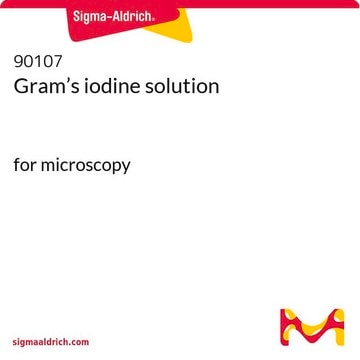15713
Universal Food pathogen ID Membrane
light pink colored, sterile, diameter 70 mm, suitable for microbiology
Sinonimo/i:
Indicator membrane, ID Membranes
Autenticatiper visualizzare i prezzi riservati alla tua organizzazione & contrattuali
About This Item
Codice UNSPSC:
41171621
NACRES:
NA.85
Prodotti consigliati
membrane size
70 mm
Sterilità
sterile
Durata
limited shelf life, expiry date on the label
Condizioni di stoccaggio
protect from light
tecniche
microbe id | specific enzyme detection: suitable
applicazioni
food and beverages
microbiology
Temperatura di conservazione
2-8°C
Compatibilità
Bacillus spp.
Escherichia coli
Listeria spp.
Salmonella spp.
Shigella spp.
Staphylococcus spp.
coliforms
enterovirulent E. coli (EEC)
Descrizione generale
Universal Food pathogen ID Membranes are substrate-carrying membranes used for rapid identification and differentiation of food pathogens through characteristic color reactions by placing on the agar surface post-incubation. The membranes contain chromogenic substrates such as ONPG, X-Gal, or X-Glu, and other substrates and indicators, which serve as the basis for microbe differentiation by color. The target organisms possess enzyme systems that metabolize the substrates in the membrane, leading to a change of color. The colors can be visually detected on the membrane. This indicates microbial enzymatic activity which serves to identify the genus and species. This economical, confirmatory and rapid identification method is suitable for microorganisms from various food, dairy, fish, and meat products.
Applicazioni
Universal Food pathogen ID Membrane is recommended for detection of food pathogens such as E. coli, E. coli O157:H7, Staphylococcus aureus, Salmonella, Bacillus, Listeria, and Shigella species, etc. from various food, dairy, fish, and meat products. They find their application in various sectors such as the water, food, and dairy industry.
Risultati analitici
Escherichia coli (25922)purpleStaphylococcus aureus (25923)golden yellowSalmonella Typhimurium (14028)colorlessBacillus cereus (10876)light green (big)Listeria monoyctogenes (19111)blue- greenEscherichia coli O157:H7 (NCTC 12900)purple pinkShigella flexneri (12022)colorless
Codice della classe di stoccaggio
11 - Combustible Solids
Classe di pericolosità dell'acqua (WGK)
WGK 3
Punto d’infiammabilità (°F)
Not applicable
Punto d’infiammabilità (°C)
Not applicable
Choose from one of the most recent versions:
Possiedi già questo prodotto?
I documenti relativi ai prodotti acquistati recentemente sono disponibili nell’Archivio dei documenti.
Peng Wang et al.
Current biology : CB, 27(21), 3278-3287 (2017-10-24)
The C
Johannes H Wilbertz et al.
Molecular cell, 73(5), 946-958 (2019-01-22)
Biological phase transitions form membrane-less organelles that generate distinct cellular environments. How molecules are partitioned between these compartments and the surrounding cellular space and the functional consequence of this localization is not well understood. Here, we report the localization of
David Deutsch et al.
eLife, 9 (2020-11-24)
Sustained changes in mood or action require persistent changes in neural activity, but it has been difficult to identify the neural circuit mechanisms that underlie persistent activity and contribute to long-lasting changes in behavior. Here, we show that a subset
Sofia Moreira et al.
Cell reports, 26(2), 293-301 (2019-01-10)
Apical-basal polarity is a common trait that underlies epithelial function. Although the asymmetric distribution of cortical polarity proteins works in a functioning equilibrium, it also retains plasticity to accommodate cell division, during which the basolateral determinant Lgl is released from
Lukas N Groschner et al.
Cell, 173(4), 894-905 (2018-05-01)
Perceptual decisions require the accumulation of sensory information to a response criterion. Most accounts of how the brain performs this process of temporal integration have focused on evolving patterns of spiking activity. We report that subthreshold changes in membrane voltage
Il team dei nostri ricercatori vanta grande esperienza in tutte le aree della ricerca quali Life Science, scienza dei materiali, sintesi chimica, cromatografia, discipline analitiche, ecc..
Contatta l'Assistenza Tecnica.







